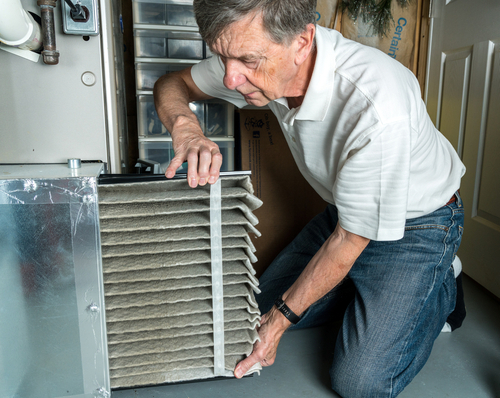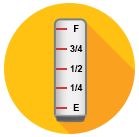 Even though it’s May, cool temperatures have lingered here in southeastern MA and Rhode Island – which means your furnace is still working away to keep your family warm and comfortable.
Even though it’s May, cool temperatures have lingered here in southeastern MA and Rhode Island – which means your furnace is still working away to keep your family warm and comfortable.
So here’s a question for you: when was the last time you checked your furnace’s air filter?
Most of us don’t do this simple heating maintenance task nearly often enough: although many factors influence the frequency with which you should change your furnace filter – how airtight your home is, whether or not you smoke or have pets that shed, and what type of material your air filter is made from, to name a few – a good rule of thumb is that your air filter should be checked once a month and changed every two to three months.
Think changing an air filter that often is overkill? Think again! When you run your furnace with a filter clogged by dust, fur, and other particles, you can expect to experience:
The good news is that furnace air filters are relatively inexpensive to replace. In fact, a filter change is part of your annual heating system maintenance, which you could schedule today and get out of the way!
The professional heating service we offer is based on the availability of technicians from our parent company Wesco Oil. If you want the peace of mind that comes with having heating oil experts a phone call away, we can help you upgrade to a Wesco Oil account.
Contact Discount Oil Brokers today to learn more about routine furnace maintenance in RI!

Try our easy-to-use oil delivery calculator to determine how much fuel you’ll need to order.

Thousands of homeowners are already saving. See if we service your area!
CHECK NOW Well, we’re heading into the last weeks of the heating season, with warmer months on the horizon here in Rhode Island and Massachusetts.
Well, we’re heading into the last weeks of the heating season, with warmer months on the horizon here in Rhode Island and Massachusetts.
But as we New Englanders know better than most, heating season ain’t over until it’s over.
With evening temperatures in our area dipping into the low 50s as late as Memorial Day, your heating system still has some work to do this spring – and if you skipped routine heating maintenance this year, you might consider taking care of that now rather than waiting until fall.
Here are some things that may indicate that your heating equipment needs attention from a heating repair professional:
If your heating equipment is showing any of these warning signs, contact us for service.
The key to preventing potentially costly heating repairs is to get your equipment serviced regularly, whether or not your heating system is showing warning signs. An annual tune-up for your furnace or boiler will help address any issues that could get worse down the road.
If your equipment already needs a repair, it’s still better to catch the problem sooner than later; the more you wait, the greater the chance for a breakdown.
Avoid late-season heating problems with expert heating service performed by the highly trained technicians at our parent company, Wesco Oil!
 You can’t really go wrong when you chose a heating oilfurnace for your Rhode Island home – it can be installed in any town (no pipeline needed), you’ll never have to worry about your fuel exploding, and you will always know it can provide enough heat to withstand the most bitter New England winter.
You can’t really go wrong when you chose a heating oilfurnace for your Rhode Island home – it can be installed in any town (no pipeline needed), you’ll never have to worry about your fuel exploding, and you will always know it can provide enough heat to withstand the most bitter New England winter.
Oil furnaces are built to last, too, with lifespans that can exceed 20 years with proper professional maintenance.
“Sounds great,“ you say. “But what about efficiency?”
Efficiency is indeed critical to the choosing a furnace, since higher efficiency saves you money on heating bills and shrinks the carbon footprint of your home.
So are heating oil furnaces efficient? Let’s take a look.
The basics of furnace fuel efficiency start with AFUE, or Annual Fuel Utilization Efficiency. The AFUE number reflects how much of the fuel your furnace consumes is actually used to produce heat in your living space (vs. how much energy is wasted along the way). For example, in an 84 AFUE unit, 84 percent of the fuel consumed by the machine goes to heating your home; the remaining 16 percent is lost somewhere along the way (usually up the chimney).
Most new oil furnaces have AFUE ratings between 84 percent (the federally-required minimum) and 90 percent. But if your furnace is old and not well maintained, your AFUE could drop into the 60s or even 50s –a big reason why the decision to upgrade your older heating equipment often pays for itself pretty quickly.
Of course, AFUE doesn’t tell the whole efficiency story. For example, gas furnaces can achieve AFUE ratings into the mid- to upper 90s – but gas also produces fewer BTUs per gallon than heating oil when burned, so whatever benefit you get from improved efficiency is diminished by gas’ lower heating power. Proper heating system installation and maintenance are also extremely important pieces of the efficiency equation.
So is an oil furnace efficient? The answer is “it depends”: an older or poorly maintained heating oil furnace often isn’t, but a new, properly installed and maintained furnace definitely is. While it may not achieve the efficiency rating of a gas furnace on paper, in the real world of home heating, an oil-fired furnace can often outperform a gas furnace by providing more heat per gallon (which means it won’t have to run as long, saving you fuel).
Add to the equation the fact that heating oil equipment typically lasts longer and requires less maintenance than gas equipment and you can see why an oil-fired furnace is such a great choice for your Rhode Island home.
Need service to help your oil furnace run at peak efficiency – or a heating oil delivery to top off your tank? We can help. Contact the heating pros at Discount Oil Brokers today to learn more!
 If you’re heating oil storage tank is more than 15 years old, it could be time to think about a replacement – especially if you have a single-walled steel tank (if you’re not sure what you have, give us a call – we’ll take a look).
If you’re heating oil storage tank is more than 15 years old, it could be time to think about a replacement – especially if you have a single-walled steel tank (if you’re not sure what you have, give us a call – we’ll take a look).
But how large a heating oil tank will you need? Is your current tank properly matched to your home’s heating load and needs? Let’s take a look.
Once you’ve thought about these sizing factors, you’ll have a better idea where to begin your search for a heating oil tank upgrade. From there, you can move on to other considerations, including tank construction materials, oil tank brands and their warranties, proper tank placement, and more.
Fill your oil tank with reliable heating oil deliveries in southeastern Massachusetts from the experts at Discount Oil Brokers. Quality heating oil at great prices – that’s how we roll! Contact us today to become a Discount Oil Brokers customer.
 Heating oil is a great way to heat your home or office – it’s safe, economical, readily available, and provides more BTUs per gallon than any other home fuel source.
Heating oil is a great way to heat your home or office – it’s safe, economical, readily available, and provides more BTUs per gallon than any other home fuel source.
Unfortunately, there’s a lot of inaccurate information circulating about heating oil that might prevent some people from choosing it to heat their home. The good news is that most of these doubts were caused by problems that have been solved by technology, or can otherwise easily be overcome with the help of an experienced heating contractor.
Let’s take a look at some oil heating system basics, along with some tips that will show you how to keep your equipment working as well or better than any other system on the market.
A heating oil furnace is a great way to heat your Connecticut home. Here’s how It works:
Notes:
Note:
Note:
Need heating oil equipment service or heating oil deliveries Rhode Island or southeastern Massachusetts? Trust the pros at Discount Oil Brokers. Contact us today to learn more, or to become a Discount Oil Brokers customer!
 Heating oil has been a heating mainstay in American homes for more than 100 years – a testament to the simple effectiveness of the fuel. But how does heating oil stack up against other fuel sources when it comes to safety?
Heating oil has been a heating mainstay in American homes for more than 100 years – a testament to the simple effectiveness of the fuel. But how does heating oil stack up against other fuel sources when it comes to safety?
Actually, it more than holds its own on that front, too.
Heating oil safety starts with the combustion characteristics of the fuel itself: unlike natural gas, heating oil will not burn in conditions you would normally find in your home. In fact, heating oil cannot burn at all in its liquid state: it will only burn under the specific conditions that your equipment creates in its combustion chamber.
Although all fuels produce potentially dangerous carbon monoxide when burned, a heating oil burner malfunction will produce smoke* – a natural warning to people in your home. A gas burner, on the other hand, will produce only colorless, odorless carbon monoxide, making a buildup of CO harder to detect.
Another safety improvement in today’s world of heating oil is the development of double wall oil storage tanks. Steel on the outside with a plastic or fiberglass inner lining, modern oil tanks are virtually leak proof.
As is true with any equipment that burns fuel, the key to keeping your heating system operating safely is routine heating maintenance from a licensed heating professional. During an annual heating tune-up, a technician will perform a range of tests to make sure your heating equipment is working properly; if he spots a potential safety issue or some other problem, he’ll take care of it right away.
Today’s heating Oil – one of the best and safest ways to heat your Rhode Island or southeastern Massachusetts home. Contact us today to become a Discount Oil Brokers customer and keep the reliable heating oil deliveries coming all fall and winter long. If you need heating system maintenance and repairs in RI or MA, we can help you there, too, with expert service from top quality, licensed technicians.
*If your oil furnace is producing smoke or soot, contact us right away — your equipment could be emitting carbon monoxide into your home. Make sure you have working carbon monoxide detectors in your home and are familiar with the telltale symptoms of CO poisoning, such as headaches, nausea, dizziness and fatigue.
 As New England autumns go, it’s been a mild one so far in 2020 – so there’s a good chance your heating system has yet to get a full workout.
As New England autumns go, it’s been a mild one so far in 2020 – so there’s a good chance your heating system has yet to get a full workout.
But we all know that cold weather is coming to Rhode Island and Massachusetts – and when it does, you may find that your heating equipment isn’t up to the challenge (especially if you haven’t scheduled your annual heating service yet).
If your furnace or boiler doesn’t answer the bell when the temperature drops this fall or winter, don’t worry – our experts are only a phone call away, able to handle just about any kind of heating system repair there is.
But before you pick up that phone, it’s a good idea to make sure the problem isn’t something you can fix yourself.
If your furnace or boiler won’t start, please try these steps before you call for service:
If you take all of the above and your heat still won’t come on, contact us and we will send a technician to fix the problem and get your heating system back on track ASAP.
For fast heating repairs done right the first time, trust the pros at Discount Oil Brokers. Contact us today for expert heating service in northern RI and southeastern MA.

Most people refer to their home heating system as a furnace, but that’s not necessarily the case: you could also have a boiler. Knowing the difference between these two appliances can come in handy when it comes to saving money on your energy bills or explaining a problem to a technician.
A furnace is the heart of a “forced air” system; it burns heating oil (or some other type of fuel) to heat air, then pushes that warmed air through a system of ducts to heat spaces in your home. The heat enters each room through vents, or registers (if you have vents in your house, you have a furnace).
Getting more from your furnace
All forced air systems use air filters to remove particles and dust from the air in your home. The more you run the unit, the more frequently you will need to check the filter. On average, check your filter once a month during peak heating season, cleaning or replacing it as needed.
There are two basic types of boiler: hot water and steam (both form part of a hydronic system). In hot water boiler, the boiler burns fuel to heat water, then pumps it through pipes and into your baseboards or radiators (if you have baseboard heating or radiators, you have a boiler). Eventually, the water returns to the unit to begin the cycle again.
A steam boiler operates more or less the same way as a hot water boiler, but converts water into steam before sending it through to your radiators and baseboards.
Getting more from your boiler
If your baseboards aren’t getting warm, check to see if the damper is open, and make sure the bottom of the unit isn’t blocked by heavy carpeting. For steam systems, check the boiler’s water gauge; low water levels can shut down your boiler.
Getting the most from your heating system starts with quality heating oil, delivered when and where you need it. Get yours from Discount Oil Brokers – join our family of customers today.

Last month, the U.S. Energy Information Administration (EIA) provided an updated forecast for home heating oil prices in the coming year. Overall the picture looks good heading into what is predicted to be a mild start to the 2020/21 heating season – but as is true in any year, that picture can change quickly.
The question is, why is that true? Why are heating oil prices so hard to predict? The answer is because the price of fuel oil is based on a number of factors that are constantly in flux, some of which include:
So what’s the best way to save on heating oil delivery in RI and southeastern MA?
While predictions in the most recent EIA report look positive overall, they could change quickly in unpredictable COVID-related conditions, with a pending U.S. presidential election to come. The bottom line is we can’t be certain where national or Rhode Island heating oil prices will go.
But we do know where you should go to buy heating oil in RI and MA: Discount Oil Brokers.
Why? Simple: when Discount delivers your oil, you know you’re getting quality HeatForce™ Home Heating Oil at the best price you’ll find in our Rhode Island and southeast Massachusetts service area, with no added fees or BS. We back that quality heating oil with nearly four decades of expertise in getting it delivered to you when you need it most, in any weather.
To learn more about reliable, low-priced heating oil deliveries in RI and southeastern MA, contact the heating oil experts at Discount Oil Brokers today!

When you buy a new (or new for you) home, there are a lot of decisions to make, including where to buy, how much to spend, and dozens of others. But one consideration you probably haven’t thought much about is one that could have a big impact on your quality of life for years to come: how the home is heated.
A home’s heating system will affect your family’s comfort for two-thirds of the year here in New England, and could have a big impact on your wallet, too.
Here in northern and central Rhode Island, we have many sources of home energy available to us, including natural gas, propane, and electricity. But one option offers stands above the rest when you consider the whole package: heating oil.
Why choose a home with a furnace or boiler powered by heating oil? Consider these eight reasons.
The bottom line: While shopping for your new Rhode Island home, keep one eye on your heating system! Once you sign on the dotted line, choose Discount Oil Brokers for the lowest-priced quality heating oil deliveries in northern and central RI.